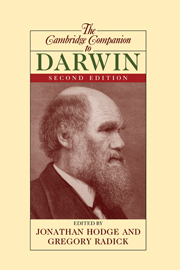Book contents
- Frontmatter
- Introduction
- Part I Darwin’s theorising
- Part II Historical contexts
- Part III Current issues
- Part IV Philosphical prospects
- 16 In Darwin’s wake, where am I?
- 17 Ethical expressions: why moralists scowl, frown and smile
- 18 Is human nature natural?
- 19 Giving Darwin his due
- Guide to further reading
- List of references
- Index
16 - In Darwin’s wake, where am I?
from Part IV - Philosphical prospects
Published online by Cambridge University Press: 28 May 2009
- Frontmatter
- Introduction
- Part I Darwin’s theorising
- Part II Historical contexts
- Part III Current issues
- Part IV Philosphical prospects
- 16 In Darwin’s wake, where am I?
- 17 Ethical expressions: why moralists scowl, frown and smile
- 18 Is human nature natural?
- 19 Giving Darwin his due
- Guide to further reading
- List of references
- Index
Summary
“Parfois je pense; et parfois, je suis.” Paul Valéery / Valéry's 'Variation sur Descartes' excellently evokes the vanishing act that has haunted philosophy ever since Darwin overturned the Cartesian tradition. If my body is composed of nothing but a team of a few trillion robotic cells, mindlessly interacting to produce all the large-scale patterns that tradition would attribute to the non-mechanical workings of my mind, there seems to be nothing left over to be me. Lurking in Darwin's shadow there is a bugbear: the incredible Disappearing Self. One of Darwin's earliest critics, Robert MacKenzie, saw what was coming and could scarcely contain his outrage: In the theory with which we have to deal, Absolute Ignorance is the artificer; so that we may enunciate as the fundamental principle of the whole system, that, IN ORDER TO MAKE A PERFECT AND BEAUTIFUL MACHINE, IT IS NOT REQUISITE TO KNOW HOW TO MAKE IT. This proposition will be found, on careful examination, to express, in condensed form, the essential purport of the Theory, and to express in a few words all Mr. Darwin's meaning; who, by a strange inversion of reasoning, seems to think Absolute Ignorance fully qualified to take the place of Absolute Wisdom in all the achievements of creative skill. This 'strange inversion of reasoning' promises - or threatens - to dissolve the Cartesian res cogitans as the wellspring of creativity, and then where will we be? Nowhere, it seems.
- Type
- Chapter
- Information
- The Cambridge Companion to Darwin , pp. 393 - 412Publisher: Cambridge University PressPrint publication year: 2009



